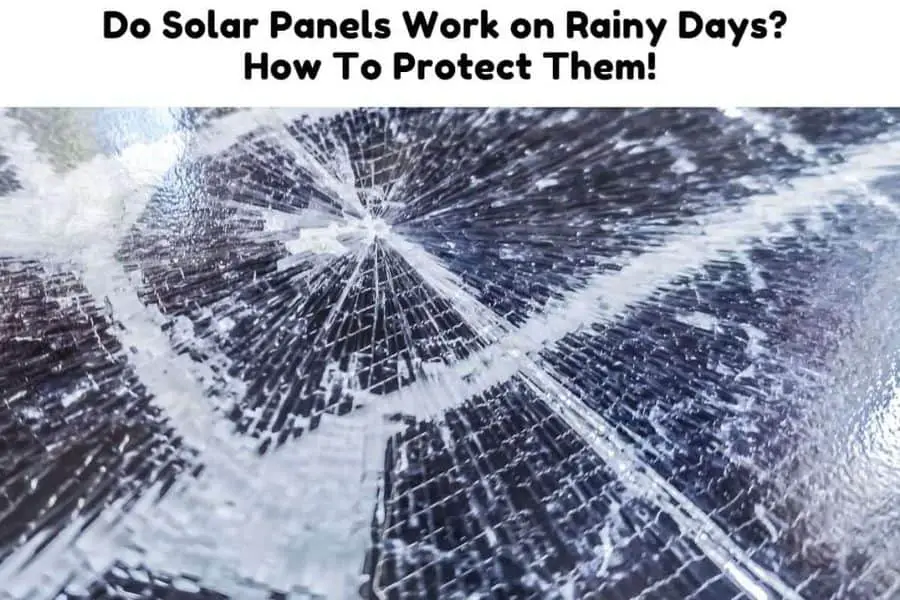How does a solar panel work if you cannot see the sun? It might seem impossible but solar panels work in rain, snow, or even on just a cloudy day.
The misconception is that for solar to work you have to be able to see the sun. This is not entirely correct because even if you do not see the sun, it is still there providing light. It is from that light that solar panels produce energy. The only time when solar panels do not produce energy is at night or when they are in shade. In both cases, there is no source of light from which there can be an electrical output.
Solar panels produce energy by converting the units of energy found in light into electrical energy. What happens then on rainy days when you cannot see the sun and there is very little light?
In this post, we answer that question by looking at how rain affects a solar panel’s capacity to produce energy. We’ll also look at what effect rain has on the solar panel itself. What happens when a solar panel gets wet?
On a side note! If you’re in need of a reliable and high-performance portable solar panel, We strongly recommend the Jackery SolarSaga 100W Portable Solar Panel (Amazon Link).
With a high conversion efficiency and foldable design, this solar panel is easy to transport and set up, making it perfect for outdoor activities like camping, hiking, and RV trips.

The US solar cell technology used in this panel ensures that you get the most efficient and reliable solar charging possible.
There is also a 60W option that is more affordable (Amazon Link)

Can You Leave Solar Panels out In the Rain?
Solar panels can be left out in the rain because they are designed and built to work outdoors. As they are outdoor equipment, solar panels are made to withstand extreme weather conditions like heat from the sun, wind speeds of up to 120 mph, and rain.
Solar panels are tested to make sure they can stand up to the harsh conditions they are exposed to out in the open. Even with the effect of hail and snow, a solar panel has a warranty of 25 years.
Solar panels are even used in space where conditions are harsher than anything experienced on earth. If they can survive in space, you can be sure they can be left out in the rain. But how does the rain affect the performance of a solar panel? Will it still produce electricity if it gets wet?
Also, find out Do Roof Solar Panels Attract Lightning? The Impact & How To Protect It!
Can Solar Panels Get Wet?
Solar panels can get wet and still produce energy. Even on a rainy day, you can still expect your solar panels to generate electricity although at a decreased rate than they would on a sunny day.
There is less light on cloudy or rainy days so naturally solar panels will produce less electricity. On cloudy days solar panels produce between 30 to 50% of their optimum output. In heavy rain, this drops even further and they will only produce between 10 to 20%. (Source)
That means a 6-kWh system will produce between 2 to 3 kWh on a cloudy day and no more than 1.5 kWh in heavy rain.
Also, check out If Solar Panels Work on Overcast Days? How To Pick The Right Panels!
What Happens When Rain Falls on Solar Panels?
When it rains the efficiency of a solar panel is reduced since there is less light for the solar panel to absorb. Materially the solar panel does not experience damage from rain except in extreme conditions like heavy hailstorms.
Rain is the best way to clean solar panels. This is especially so for rooftop solar panels which are harder to reach. Rain washes away the dust and dirt that accumulates and reduces a solar panel’s ability to absorb light. (Source)
Also, find out Can Solar Panels Withstand Hail? How To Protect Yours!
Do Solar Panels Need to Be Waterproof?
Solar panels need to be waterproof to prevent water from entering the panel. A solar panel is an electrical piece of equipment that is used outdoors. As it is used outside it is exposed to weather elements like rain which means it will get wet. Electricity and wetness do not go together so a solar panel has to be waterproof to prevent water from seeping into the panel.
Solar panels are made from several components that make them water-resistant. The solar cells are covered by thin glass that is between 6 to 7mm thick. Beneath the glass casing is insulation and a polymer back sheet. All this is held together by a metal frame and sealant glue to make the whole assembly waterproof.
Also, find out If Solar Panels Work Underwater?
Solar panel manufacturers provide a warranty on their solar panels. The warranty covers the performance of the solar panel and the material condition of the solar panel. The latter is covered in terms of the equipment warranty.
The equipment warranty of a solar panel protects you against any possible defects or faults that may occur in the solar panel.
One of those faults relates to water damage
Equipment warranties last up to 12 years. In the event your solar panel is damaged by water intake, the manufacturer will replace the solar panel at no cost to you.
How to Protect Solar Panels from Rain
The best way to protect solar panels from rain is to install them at an angle. This allows rain to slide off the panel instead of pooling on the panel. Another measure you can take to protect solar panels from rain is using covers.
Covering up solar panels can protect them from getting the worst of a rainstorm. Generally, however, this is a step you would want to take only in extreme cases. Solar panels are made from sturdy material and can handle rain and heavy weather.
How can I protect my solar panels in general?
The most important thing to do to protect your solar panels is to install them correctly and maintain them once they’ve been installed. Doing these two things will ensure you get maximum output from solar panels throughout their lifespan.
Installing and maintaining solar panels
Here are some general guidelines for installing solar panels the right way:
- Site them properly. This relates to where you have them installed. Solar panels work best when installed where they receive direct sunlight without any shading. They should also face south and be tilted at an angle of about 15°.
- Have them installed by a certified professional if you want to avoid voiding the warranty on your solar panels.
- Regularly clean the solar panels. Rain is an efficient way to do this but you can also hose them down. For more on this, check out our post Do Roof Solar Panels Need to Be Cleaned? Why, How & How Often!
Just by following these three simple steps, you will ensure maximum energy production from your solar panels.
Also, find out “If Solar Panels Work at Night with Moonlight?“
